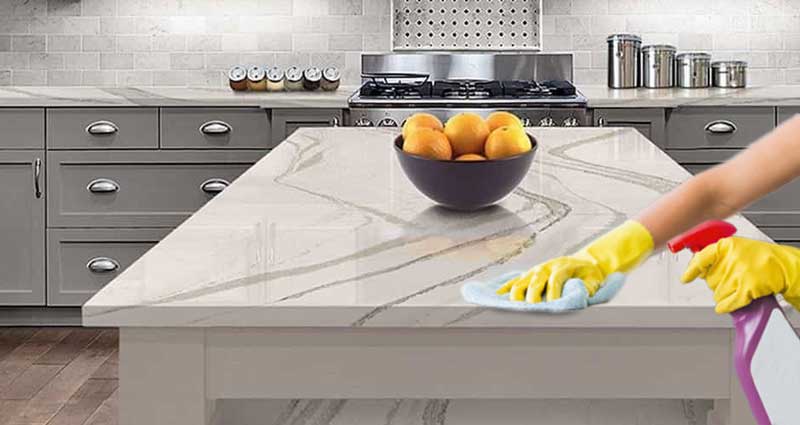Quartz Countertop Cleaning San Diego
 Cleaning Quartz Countertops
Cleaning Quartz Countertops
Since the development of quartz countertops has kept pace with Granite’s growth, more people are asking, “What is the best way to clean countertops made of quartz?” Today, we’re going to talk about how to properly sanitize your quartz counters.
Quartz tabletop installations have increased as a result of the material’s dependability and beauty. Quartz is a produced good made of resins, recycled materials like glass, and other components. In addition to creating a durable surface, the production process also enables the creation and duplication of countless lovely details and hues. This procedure also results in the creation of a hermetic seal, which stops bacteria and other harmful elements from penetrating the stunning surfaces. It is a strong advantage over natural stones because these materials need to be sealed in order to prevent staining and possible bacterial growth on the countertops.
While we have concentrated on some fundamental benefits of choosing Quartz countertops, we also need to establish a regular cleansing schedule. It’s the only method to guarantee that the quartz counters stay spotless.Here is our advice on how to clean quartz worktops and the best ways to keep the surfaces spotless for the foreseeable future.
Cleaning Daily
You should regularly sanitize the quartz countertops, as advised. Making this easy routine a habit will help to prevent stains from spills and food from sticking to the lovely quartz coating. You’ll need to sanitize it with a solution of warm water and mild dish detergent. The steps we recommend are as follows: pour a generous quantity of dish detergent solution into a medium-sized bowl of warm water.Gently combine the two components until the detergent is dissolved in the water. From this point on, simply wet the towel and begin wiping the area in a circular manner until it is thoroughly cleaned. Use paper towels or a plain cloth to dry it off and wipe away any excess water or detergent.
Difficult Stains
Accidents do happen occasionally, and you might find a spill or stain on the quartz countertops that is difficult to remove with tepid water and a mild detergent. You should attempt a few other cleaning techniques in this situation. Despite the fact that these are generally safe to use on quartz surfaces, always refer to the owner’s manual or the installer to avoid causing any irreparable harm while trying to remove these difficult stains.
Rubbish alcohol can be used to remove lines made by pens or perhaps an accidental permanent marker mark. Since alcohol is a solvent, it would dissolve all ink and marker stains and make them simpler to wipe off. Spray a small amount of rubbing alcohol onto the stain to commence. Then, use a clean towel to rub the surface in a circular motion to remove the stain. Once this has been accomplished, apply some warm water to the region and completely dry it with a towel.
In the event that your surface begins to accumulate a hard water deposit or a soap stain, we have a remedy for you. We advise using a 1:1 vinegar and water combination to assist in solving these kinds of issues.In a medium-sized cup, combine one part warm water and one part vinegar. Stir the mixture, then pour some of it over the affected region. Use a fresh towel to clean the region. After eliminating the problem area, wash it with tepid water once more to completely remove the solution mixture from the surface. To finish, dry the area by rubbing it with a fresh towel or piece of paper.
Finally, you could use a degreaser cleaning detergent to remove a grease residue. Use only a product designed for quartz surfaces if it is available. Review all of the manufacturer’s directions carefully because each product has a unique set of requirements. After using one of those items, thoroughly rinse your mouth out with tepid water!
Please use extra caution when utilizing either of the two techniques discussed above. While these procedures are being used, YOU SHOULD NOT neglect to keep an eye on the surfaces. Always give the quartz surfaces a good rinse after using these cleaning techniques. Above all, look to the manufacturer’s instructions for cleaning up your particular quartz surface.
Cleaning Processes That You Should Avoid
There are a variety of favored cleaning procedures and substances used by quartz countertop manufacturers. To wrap up, they advise against using sponges, brushes, and abrasive cleaners. Such things will permanently damage your countertops. On quartz countertops, even vigorous cleaning can result in a dull appearance. When washing the quartz, stay away from concentrated bleach because it will leave stains. All cleansers with a high pH level should be avoided; examples include dishwashing detergent, grill and oven cleaners, and cleaners for paint stains. Any safety guarantee you have for your crystal will be void if you use any of these methods.
Regular Prevention
We’ll now discuss some constructive methods for incorporating the cleansing techniques we started with. We have some recommendations to help your quartz worktops last a long time. Quartz nonetheless appears to be a material with a high level of durability, but it is still breakable.
Put a covering between the pans and the heated pots as well. Because quartz and its natural stone equivalents don’t really withstand heat, heat exposure can be a frightening issue. If you place a hot pot or saucepan on the surface without using a trivet or pot support, it could stain the surface. Avoid immediately placing hot objects on your Quartz countertops.
Another safety measure is to avoid cutting or chopping anything immediately on the quartz. These actions will cut and scratch the resin, leaving your worktops vulnerable to stains and other issues.
Finally, we’ll return to our starting point. By enhancing their durability, maintain your countertops and keep them looking gorgeous. Establish a practice for washing the quartz surface with warm water and a mild detergent solution.


